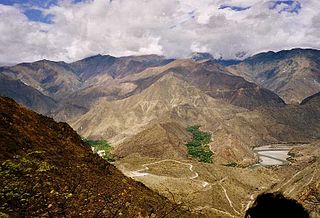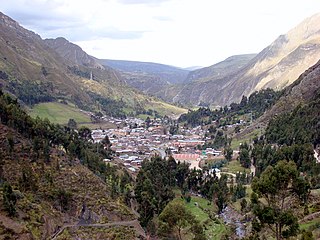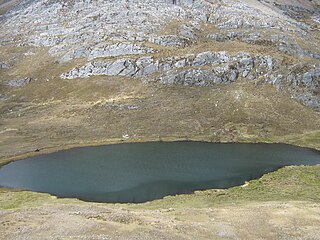| Tawqan | |
|---|---|
| Highest point | |
| Elevation | 5,200 m (17,100 ft) [1] |
| Coordinates | 09°58′41″S77°01′23″W / 9.97806°S 77.02306°W Coordinates: 09°58′41″S77°01′23″W / 9.97806°S 77.02306°W |
| Geography | |
| Location | Peru, Ancash Region |
| Parent range | Andes, Wallanka |
Tawqan (Quechua tawqa heap, pile, -n a suffix, [2] Hispanicized spelling Taucán) [3] is a mountain in the Wallanka mountain range in the Andes of Peru which reaches an altitude of approximately 5,200 m (17,100 ft). It is located in the Ancash Region, Bolognesi Province, in the districts of Aquia, Huallanca and Huasta, [1] northwest of Chawpi Hanka.
In linguistics, a suffix is an affix which is placed after the stem of a word. Common examples are case endings, which indicate the grammatical case of nouns or adjectives, and verb endings, which form the conjugation of verbs.

The Andes or Andean Mountains are the longest continental mountain range in the world, forming a continuous highland along the western edge of South America. This range is about 7,000 km (4,300 mi) long, about 200 to 700 km wide, and of an average height of about 4,000 m (13,000 ft). The Andes extend from north to south through seven South American countries: Venezuela, Colombia, Ecuador, Peru, Bolivia, Chile and Argentina.

Peru, officially the Republic of Peru, is a country in western South America. It is bordered in the north by Ecuador and Colombia, in the east by Brazil, in the southeast by Bolivia, in the south by Chile, and in the west by the Pacific Ocean. Peru is a megadiverse country with habitats ranging from the arid plains of the Pacific coastal region in the west to the peaks of the Andes mountains vertically extending from the north to the southeast of the country to the tropical Amazon Basin rainforest in the east with the Amazon river.
The name of the mountain correlates with the name of a small lake at its feet at 9°59′00″S77°00′26″W / 9.98333°S 77.00722°W , Tawqanqucha in Quechua (Hispanicized Laguna Taucán or Laguna Aguascocha Superior). [4] Awasqucha (Laguna Aguascocha Inferior) lies immediately east of it. [4] This is where the Ch'iyar Juqhu River (Aymara for "black swamp", also spelled Chiurucu, Chiúrucu, Chuirucu) originates. Its waters flow to the Marañón River.

Aymara is an Aymaran language spoken by the Aymara people of the Andes. It is one of only a handful of Native American languages with over one million speakers. Aymara, along with Spanish, is one of the official languages of Bolivia and parts of Peru. It is also spoken, to a much lesser extent, by some communities in northern Chile, where it is a recognized minority language.

The Marañón River is the principal or mainstem source of the Amazon River, arising about 160 km to the northeast of Lima, Peru, and flowing through a deeply eroded Andean valley in a northwesterly direction, along the eastern base of the Cordillera of the Andes, as far as 5° 36′ southern latitude; from where it makes a great bend to the northeast, and cuts through the jungle Andes, until at the Pongo de Manseriche it flows into the flat Amazon basin. Although historically, the term "Marañon River" often was applied to the river all the way to the Atlantic Ocean, nowadays the Marañon River is generally thought to end at the confluence with the Ucayali River, after which most cartographers label the ensuing waterway the Amazon River.






